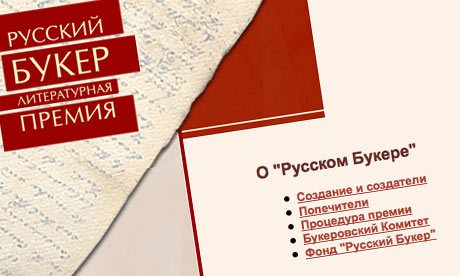
The Booker prize shortlist was announced this month, but you probably won't have read about it. According to one of the judges, the novels in contention all have a historical theme. There was a surprise omission of an award-winning longlisted writer. The reason for the resounding silence that greets the announcement? This is the Russian Booker prize.
Obama may be warming up to Russia, but the cold war apparently continues in the books world – at least on our side. While Hilary Mantel's Man Booker win was reported widely in the Russian press, from newspapers to literary blogs, contemporary Russian fiction appears to have fallen off western literary radar. Of course, bewailing the dearth of foreign literature in translation is nothing new. But the lack of interest in today's Russian writers is particularly striking given the enduring influence of their predecessors: Dostoevsky, Tolstoy, Chekhov, Pushkin ... It seems the only good Russian writer is a dead Russian writer.
So why is this? It seems logical to look first to the language barrier. The Russian Booker Prize website no longer includes an English language version, which is not exactly welcoming. Not everyone is willing to dedicate years to learning that verbs of motion change according to direction and intention. Type "Russian novel" into a search engine and the overwhelming majority of results in English relate to the aforementioned dead writers. But there is information out there, if you know where to look. For those in London, Academia Rossica's Russian Literature Week 2009 boasted an impressive list of visiting authors. Getting hold of their work in English, however, can be a challenge. Publishers are presumably reluctant to spend the time and money necessary for translating from complex languages, although this hasn't hindered the Western success of Ma Jian and Jiang Rong.
Or is the problem that modern Russian fiction just isn't very good? This may have been so during the stagnation of the early 1990s, but the Russian language literary scene is increasingly vibrant. Authors such as Dmitry Bykov, Vladimir Makanin and Ludmilla Ulitskaya have produced works that easily compete with those of their English language contemporaries, even Martine McCutcheon. And then there are those rouble-rich accolades. While I realise that book prizes are not always the best way of gauging quality, they are a useful way of taking a country's literary temperature, and Russia is currently awash with awards, from the UK-inspired Booker to the National Bestseller and the Big Book, founded by everyone's favourite oligarch, Roman Abramovich. There's also a healthy literary counterculture, beginning with the (now defunct) Anti-Booker Prize in 1995 and the Debut Prize for young writers.
Maybe it's that we're just not hugely interested in eastern Europe. But if this is true, why the glut of English language books over the last few years that deal with Russia? It would be possible to fill a bookcase with them: Martin Amis's House of Meetings, James Meek's The People's Act of Love, Gillian Slovo's Ice Road, Simon Sebag Montefiore's Sashenka. Tom Rob Smith's Child 44, a detective thriller set in Soviet Russia, was a surprise inclusion on the 2008 Man Booker longlist. Clearly there's an appetite – or at least, publishers believe there is – for western writers struggling to get their heads round the idea of the Russian "soul". So why don't we want the real deal? There's a school of thought that Russian writing is, well, "too Russian"; that western readers won't understand the bleak humour and cultural references. The success of the darkly satirical Death and the Penguin by Andrey Kurkov – who is Ukrainian, admittedly, but writes in Russian – would seem to disprove this.
Russia is due to be the guest of honour at the 2011 London Book Fair, which may have an impact on interest in the country's writers – although apparently not if Russia has anything to do with it. A blog from this year's Frankfurt Book Fair had a prominent member of the Russian delegation unwilling to name any great contemporary Russian authors on the basis that they're not as good as Tolstoy. Perhaps, after all, this is the problem: literary heritage as albatross.

